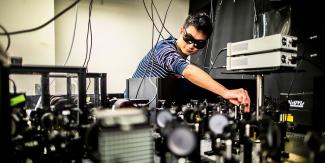
The University of Pennsylvania Department of Physics and Astronomy combines world-leading science with the intimate faculty-student community unique to small departments. We are among the smallest of all Physics and Astronomy Departments of the top 25, but we have labs and facilities comparable to some national laboratories, and we often top the list of most highly-cited research. We have three broad areas of research: Condensed Matter Physics, which includes experimental and theoretical work in hard condensed matter, quantum materials, soft condensed matter, biophysics, and living matter; Astronomy, which at Penn includes experimental theoretical and experimental astronomy, dark energy and dark matter, galactic observations and modeling, and extrasolar planet searches; and Particle Physics, which on the experimental side includes higgs and SUSY searches at ATLAS, and low- and high-energy neutrino physics with experiments like SNO+, T2K, and DUNE, and on the theoretical side includes string theory and phenomenology, broad and deep explorations of field theory, and implications for cosmology.
Our graduate students typically focus their first year of study on graduate-level coursework and becoming acquainted with the Department’s research groups. Starting research with a group in a student’s first year, and in particular the summer before their first year, is strongly encouraged. Students need not stay with the group they start with, but can move between groups if they find their interests have changed. In their second year, students join a group and begin their own original research in direct collaboration with faculty and postdocs; each of whom are leaders and pioneers in their respective fields.
Doctoral degree requirements can be found here, but in essence include three or four semesters of coursework, an oral candidacy exam based on a piece of independent research typically taken in Year 3, and a formal written dissertation based on unique, original research contributions to physics, defended in a final oral exam.
Essentially all graduate students receive full tuition support and a stipend. First-year students are generally supported as Teaching Fellows, working roughly 15 hours a week as lab instructors or graders, a level intended to not interfere with coursework. Second-year students and advanced students are typically supported as Research Fellows.
While the University of Pennsylvania provides a legal nondiscrimination statement that the Department of Physics and Astronomy wholly supports and abides by, we as a Department would like to extend an informal statement in regard to diversity and inclusion in physics: It is incumbent on us all as a global community of scientists to actively participate in the diversification of science, technology, engineering and mathematics by directly and intentionally engaging those groups that are underrepresented in our individual fields. Toward this end the Department of Physics and Astronomy would like to explicitly invite members of those groups which are unfortunately still underrepresented in Physics and Astronomy to apply to our graduate program, either directly, or through the APS Bridge Program. Read more about Diversity at Physics and Astronomy.
